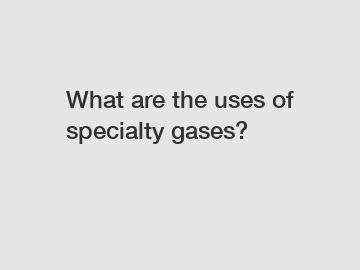Feb. 02, 2024
Chemicals
TYHJ contains other products and information you need, so please check it out.
What are the uses of specialty gases? Specialty gases play a crucial role in numerous industries and scientific applications due to their unique properties and composition. Let's explore the various uses of these gases and how they contribute to enhancing our daily lives.
1. Analytical and Laboratory Applications: Specialty gases are extensively employed in analytical laboratories for precise measurements and testing. Gases, such as high-purity nitrogen and oxygen, are used as carrier gases for gas chromatography, mass spectrometry, and atomic absorption spectroscopy. Their purity and stability ensure accurate results in research, quality control, and industrial testing.

2. Healthcare and Medical Applications: Specialty gases are vital in the healthcare sector for medical procedures, diagnostics, and treatments. Oxygen is widely used for breathing support in hospitals and clinics, assisting patients with respiratory conditions. Nitrous oxide, or laughing gas, finds its use in dental procedures as an anesthetic. Carbon dioxide and helium are employed during minimally invasive surgeries and arthroscopy.
3. Industrial Manufacturing: Specialty gases find extensive applications in various industries. Argon, helium, and nitrogen are commonly used in welding and metal fabrication processes. Argon provides an inert atmosphere, preventing oxidation and ensuring high-quality welds. Helium is utilized for leak testing, while nitrogen is employed for purging, pressurizing, and blanketing during chemical and semiconductor manufacturing.
4. Electronics and Semiconductor Industry: Specialty gases are indispensable in the electronics and semiconductor industry. High-purity gases, such as nitrogen, helium, and argon, are utilized throughout the manufacturing process to create a controlled environment, removing impurities and preventing oxidation. These gases are crucial for integrated circuit manufacturing, advanced lithography techniques, and wafer etching processes.
5. Environmental Applications: Specialty gases are key in environmental monitoring and analysis. Methane, ozone, carbon dioxide, and other gas standards are crucial for calibrating sensors and monitoring air quality. These gases aid in tracking and minimizing greenhouse gas emissions, essential for climate change research and regulation compliance.
6. Food and Beverage Industry: Specialty gases play a significant role in the food and beverage industry. Carbon dioxide finds its use in carbonation of drinks and beers, providing the desired fizziness. Nitrogen is commonly employed for beer and wine dispensing, ensuring proper texture, taste, and quality. Gases like oxygen and nitrogen are used for food packaging, extending shelf life and maintaining product freshness.
7. Energy Sector: Specialty gases contribute to the energy industry in multiple ways. Hydrogen, as a specialty gas, is increasingly utilized for clean energy applications, including fuel cells and hydrogen-powered vehicles. Calibration gases play a crucial role in ensuring accurate measurements for natural gas extraction, distribution, and energy production.
8. Research and Development: Specialty gases are vital components in various research and development activities. Scientists and researchers rely on gases such as helium, hydrogen, oxygen, and argon for conducting experiments, testing hypotheses, and developing new technologies. These gases enable innovation and discoveries in fields like material science, biochemistry, and renewable energy.
In conclusion, specialty gases find extensive applications across multiple industries, revolutionizing scientific research, industrial processes, and healthcare. Whether it's analytical testing, healthcare support, electronics manufacturing, or environmental monitoring, specialty gases provide enhanced safety, accuracy, and efficiency. By harnessing the unique properties of these gases, industries continue to push boundaries and improve various aspects of our daily lives. So, what are the uses of specialty gases? From laboratories to manufacturing plants, their applications are truly limitless.
For more sulfur hexafluoride for saleinformation, please contact us. We will provide professional answers.
Previous: Unlocking the Benefits: Sustainable Wood Cellulose Fiber Exporter Solving Google Users' Queries
If you are interested in sending in a Guest Blogger Submission,welcome to write for us!
All Comments ( 0 )